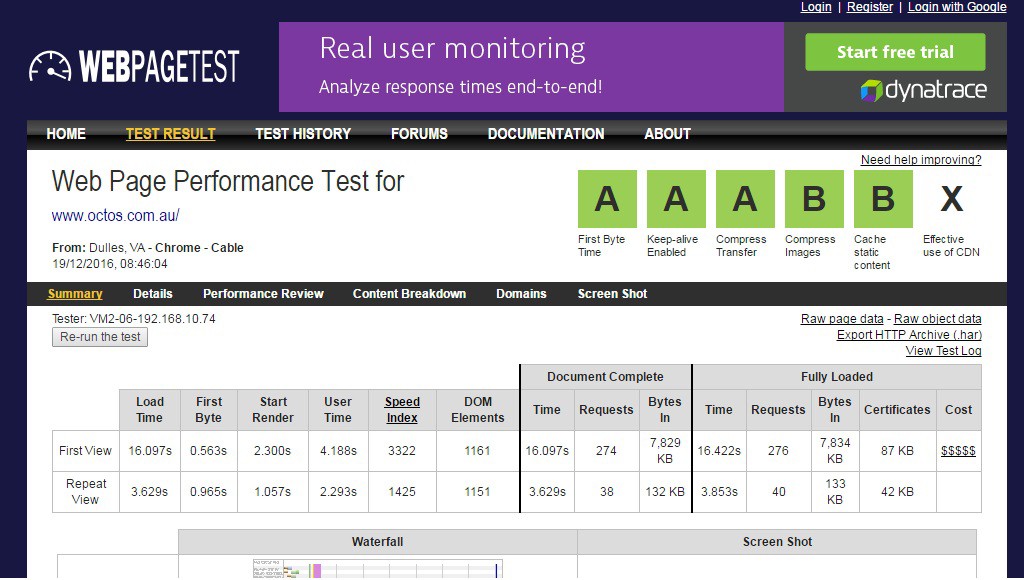How does your website speed affect your search result ranking?
- Rahul Doshi
- December 21, 2016
- 3 Minute Read

You may have experience of waiting for billing lines, restaurant queues, traffic queues, but now-a-days there is another “wait” which is booming among the audience and is intolerable. And it is none other than WWW (World Wide Wait). People can’t bear the minimal wait they must do, while loading of a website properly. Even Google has a thing for the sites that have clean codes and download quite fast. As per a survey done, nearly half of the web users (47%) expect a website to load in 2 seconds or less, and 40% tend to abandon the URL if the website load time is more than 3 seconds.

Google, in the past used to rank websites on many different factors related to things like title tags, URL, content, authenticity, uniqueness etc. But in April 2010, Google made an announcement stating that website’s speed would also impact its ranking too, making website loading speed as one of the factors in search ranking algorithms.
So, if the users are having trouble with your website’s loading speed, they neither return to your website to look and buy nor even share their online experience with their close ones. This means, you are not just losing on to your current visitors but even the future sales.
Here are some of the ways you can utilise to reduce server response time of your website:
1. Optimize the images: High resolution images used in your website can slow down your loading speed. So, it’s better to get them optimize first using any possible softwares (offline-online) in the market.
2. Avoid unnecessary ads: Many ads on your website can bother users as well as increases your loading time. Hence, avoiding such ads can make user’s experience better with your website.
3. Using of external hosts: Moving off the large files (video, audio or any other) to external hosts can also reduce your website load time.
4. Limited plugins: Avoid using of irrelevant plugins into your website and keeping a check on their functioning will help to speed up a little.
5. Enhancing of hosting plan: Boost your hosting plan to provide dedicated hosting services, to avoid extra expenditures later, as you will get what you pay for.
6. Theme/UI/UX: Sometimes your designing gets too complex with all the effects, just to impress the users that it slows down your website’s speed. To avoid this, keep your designing simple, neat, and attractive.
7. Widgets: There are some comment sections and social buttons on the website that slows down your website’s speed. Try to utilize those areas carefully.
8. Don’t puzzle browser or user with redirects: A pile of 301 Redirects can confuse the browser or user of the website leading to the slowing down of the website’s performance. Hence, eliminating them can get you back on track.
9. Quarrel with your scripts: Keeping the Cascading Stylesheets and JavaScript in external files can save up a lot of loading time instead of keeping them coupled with each webpage. That way the browser loads the script only once, rather than every time the page is loaded.
Website Speed Test Tools that can help you keep a check on your website’s speed and performance:
1. Pingdom Website Speed Tool: It helps in testing and analyzing the loading time of a page as well as find issues.
2. GTmetrix and Yslow: These both help in analyzing the website’s performance and give you insights to improve your website’s speed. They also provide grades to the websites based on some pre-defined set of rules or user-defined set of rules. Moreover, Yslow is an extension which can be added to any of your browser.
3. PageSpeed Insight Tool: This tool from Google itself, helps in analyzing the performance of your website on both desktop as well as mobile platforms. It provides you the recommendations based on priorities as well as score of your website, out of 100.
4. Webpage Test Tool: This tool gives grade to your website from A to F based upon the performance. It also has a unique feature as it presents the first view and repeat view.

5. DareBoost Tool: This tool is new in the market and gives your site score from 100. The report it produces have different checkpoints and is splitted into many categories as per priorities.
From the above results, it’s very much clear that every second is important and gets counted in the digital world. Hence, having a fast loading website is better for users as well as for owner itself, for best possible results and ranking higher on the search result pages, making ‘website load time‘ a significant factor.

Thank you for submitting the details!
We will keep your information safe. Feel free to contact us with any questions at hello@uplers.com
Please check your email for next steps shared by Robert.


![How to Hire an SEO Expert from India: Guide for Hiring Managers [+SEO Specialist Job Description Tips and Salary Analysis]](https://www.uplers.com/wp-content/uploads/2024/03/How-to-hire-an-SEO-expert-from-India-Guide-for-hiring-managers-Job-description-tips-and-salary-analysis-436x265.jpg)














